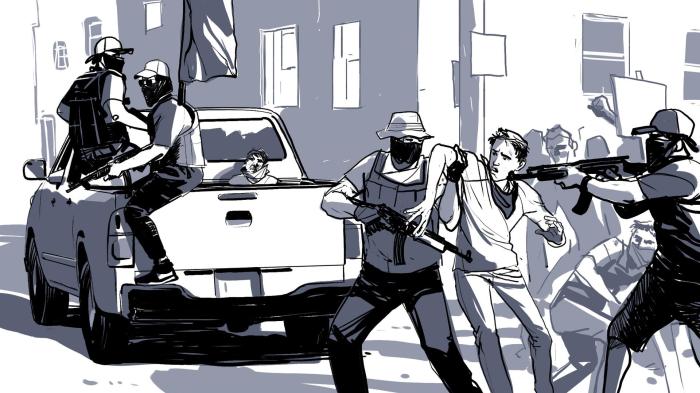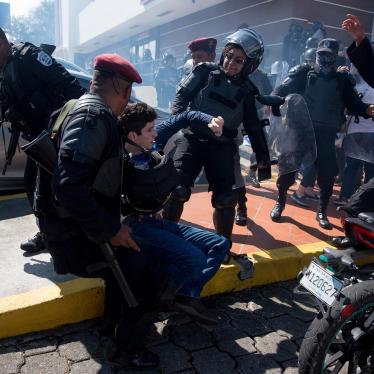(Washington, DC) – Governments in the Americas and Europe should impose targeted sanctions against top Nicaraguan authorities implicated in egregious abuses and explore avenues to press for accountability, Human Rights Watch said in a report released today.
The 98-page report, “Crackdown in Nicaragua: Torture, Ill-Treatment, and Prosecutions of Protesters and Opponents,” documents what happened to many of the hundreds of people arrested by police or abducted by armed pro-government groups after the crackdown on protesters that began in April 2018. Many were subjected to abuse that in some cases amounted to torture. Some who were injured were reportedly denied medical care in public health centers, and doctors who provided care said they suffered retaliation. Detainees have been prosecuted in cases marred by serious due process violations.
“Daniel Ortega has shown no real commitment to justice for the victims of the brutal crackdown by National Police and armed thugs during the 2018 protests,” said José Miguel Vivanco, Americas director at Human Rights Watch. “The recent release of dozens of people detained in the context of the protests, many of whom are under house arrest and still face prosecution, cannot overshadow the fact that not a single police officer is even under criminal investigation for the beatings, rapes, nail removal, asphyxiation, and other atrocities.”
The report is based on research conducted in Nicaragua and Costa Rica and a review of official sources, including judicial files and statements by government sources, as well as corroborating evidence such as photographs, footage, or medical reports. Human Rights Watch interviewed 75 people, including victims and their relatives, witnesses, defense attorneys, medical professionals, and representatives of international organizations. Some interviews were conducted via telephone or messaging services prior to and following the fact-finding mission.
Human Rights Watch found that police and armed pro-government groups severely abused detainees, in some cases rising to the level of torture. The abuses include beating captured protesters during arrests and in detention, at times denying them urgent medical attention; raping detainees, including with metal tubes and firearms; waterboarding; electric shocks; acid burns; mock executions; forced nudity; and removal of fingernails. In some cases, detainees were forced to record self-incriminating confessions.
In April 2018, huge numbers of Nicaraguans took to the streets to protest the Ortega government. They were met with violence. The brutal crackdown by the National Police and heavily armed pro-government groups left more than 300 people dead and more than 2,000 injured. The Inter-American Commission of Human Rights (IACHR) estimates that nearly 800 people have been detained since the protests started.
In March 2019, the Nicaraguan government agreed to release those who had been detained in the context of anti-government protests within 90 days and to drop the charges against them, in an effort to restart stalled talks with the opposition and to persuade the international community to lift sanctions. As of June 10, 392 people had been released, but many were sent to house arrest and the charges against them remain. Others benefited from an amnesty law passed in June.
On June 8, the Nicaraguan National Assembly passed an amnesty law for crimes committed in the context of anti-government protests. The law indicates that crimes “regulated in international treaties ratified by Nicaragua” will be excluded from amnesties. Yet, given the lack of judicial independence in the country, there is a serious risk that the law will be used to consolidate the impunity for officers responsible for serious abuses in the country, Human Rights Watch said.
The United Nations Office of the High Commissioner for Human Rights (OHCHR) has reported that, based on available information, just one sentence has been handed down against a member of an armed pro-government group and not a single investigation has been opened into security forces implicated in abuses. Human Rights Watch has been unable to confirm if the killing that led to the sentence occurred during a protest. Instead of holding them accountable, President Ortega has promoted top officials who bear responsibility for the abuses.
Senior government officials who bear responsibility for gross human rights violations and should be subjected to targeted sanctions, such as travel bans and assets freezes, include:
- President Daniel Ortega, who is supreme chief of the National Police and has sweeping powers, including to “command” the police at his will and dismiss police chiefs when they disobey his orders;
- Retired General Aminta Granera, former National Police chief until she was replaced by General Francisco Díaz in September 2018;
- General Francisco Díaz, the National Police chief, who is believed to have exercised significant control over the force first as deputy director and then later in his current position;
- General Ramon Avellán, the National Police deputy chief, the highest-ranking member of the National Police in Masaya, where police under his leadership together with armed pro-government gangs brutally repressed protesters;
- General Jaime Vanegas, the National Police inspector general, who is required under Nicaraguan law to investigate alleged rights violations by police officers and sanction those responsible;
- General Luis Pérez Olivas, chief of the El Chipote prison, one of the main sites where authorities egregiously abused anti-government demonstrators; and
- General Justo Pastor Urbina, chief of the Department of Special Operations (DOEP, by its Spanish acronym), which played a “central role” in repression throughout the country, the Interdisciplinary Group of Independent Experts of the IACHR reported.
Many detainees have been prosecuted, in some cases for serious violent crimes, for their participation in anti-government protests or their role in social movements that challenged the government, even prior to the crackdown. These prosecutions have entailed serious violations of due process and other fundamental rights, including incommunicado detention and closed-door trials.
The Nicaraguan government has also raided the offices of independent media outlets, filed criminal charges against two journalists, cancelled the legal registration of nine nongovernmental organizations, and expelled foreign journalists and international human rights monitors from the country.
The cases Human Rights Watch documented are consistent with a pattern of systematic abuse against anti-government protesters and opponents that has been reported by the IACHR and the OHCHR. Around 62,000 Nicaraguans have fled their country since April 2018, according to the United Nations High Commissioner for Refugees (UNHCR).
“The only way to curb widespread abuses, allow Nicaraguans to return from exile, end censorship, and restore judicial independence is through sustained international pressure that should include targeted sanctions and increased pressure for accountability,” Vivanco said.









